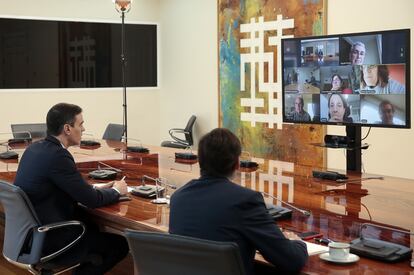Spain purchases 640,000 coronavirus testing kits, which will arrive “in coming days”
Seventy percent of patients in intensive care are aged above 60 years old, health authorities report

On Saturday afternoon, members of the Committee for the Technical Management of Covid-19 held a press conference. María José Serra, from the Health Ministry’s Coordination Center for Health Alerts, began by confirming that the director of her department, Fernando Simón – one of the most visible faces of the coronavirus crisis in Spain – had tested negative for the virus.
The committee explained that a total of 1,325 people have died from the coronavirus in Spain, with nearly 13,000 people receiving hospital treatment. They added that they would be stepping up their purchasing of essential supplies for the health system, such as protective masks, as well as supporting national manufacturers. Sectors with the capability to produce such items would also, they added, be starting production of these items.
Any vaccine against the SARS-CoV-2 coronavirus will be fast-tracked, and will not have to go through conventional processes
María Jesús Lamas, from the Spanish Agency for Medications, explained that authorization of any vaccine against the SARS-CoV-2 coronavirus would be fast-tracked, and would not have to go through conventional processes.
Raquel Yotti, from the Carlos III Health Institute, explained that there were at least four companies in Spain that were supplying coronavirus tests. “We have purchased 640,000 tests in the international market,” she explained. “The fast tests will be done in a number of different areas. The results come back in 15 minutes. They are already being distributed.”
Rodrigo Gutiérrez, from the Health Ministry’s Professional Planning department, explained that the Spanish health system currently counts on 350,000 professionals. “The ministry has placed a further 50,000 professionals at the service of the regions,” he said, drawing attention to the capacity of health staff to respond to the needs of the service at the current time of the pandemic.
The data tells us that we are reaching the peak, which will not be the same in all of the regionsMaría José Serra
María José Serra also supplied greater detail about the profile of coronavirus patients in Spain. “Fifty percent of those hospitalized are over 70 years old,” she said. “Around 70% of those in intensive care are aged above 60 years old.”
Serra added that “no one can say whether we will overtake the number of victims in Italy. The data tells us that we are reaching the peak, which will not be the same in all of the regions.”
Serra described the social-distancing measures in Spain as “among the most drastic.” “The most important thing is that they are observed. We are evaluating them, but for now they are adequate.”
The general secretary for transport, María José Rallo del Olmo, explained that fewer and fewer people in Spain were traveling as the days passed. “On the [high-speed] AVE [train network], just 6,000 people traveled yesterday,” she explained.
The joint operational director of the National Police, José Ángel González, said that there would be ‘zero tolerance’ for offenders
Laurentino Ceña, the joint operational director for the Civil Guard, said that after a week on lockdown, “in general, the behavior [of citizens] has been magnificent.” He added that there had been exceptions, and that his force had made 25 arrests on Friday for non-compliance. He also drew attention to the challenge of keeping domestic violence cases under control, and called on citizens to use social networks to report possible crimes.
The joint operational director of the National Police, José Ángel González, said that there would be “zero tolerance” for offenders. “We are not going to allow for a few people to behave imprudently. Yesterday we saw an increase in arrests, there were around 6,000 reports of disobeying the authorities.” González called on citizens to call 091 to report crimes, but also to use official social media accounts as well.
English version by Simon Hunter.
Tu suscripción se está usando en otro dispositivo
¿Quieres añadir otro usuario a tu suscripción?
Si continúas leyendo en este dispositivo, no se podrá leer en el otro.
FlechaTu suscripción se está usando en otro dispositivo y solo puedes acceder a EL PAÍS desde un dispositivo a la vez.
Si quieres compartir tu cuenta, cambia tu suscripción a la modalidad Premium, así podrás añadir otro usuario. Cada uno accederá con su propia cuenta de email, lo que os permitirá personalizar vuestra experiencia en EL PAÍS.
¿Tienes una suscripción de empresa? Accede aquí para contratar más cuentas.
En el caso de no saber quién está usando tu cuenta, te recomendamos cambiar tu contraseña aquí.
Si decides continuar compartiendo tu cuenta, este mensaje se mostrará en tu dispositivo y en el de la otra persona que está usando tu cuenta de forma indefinida, afectando a tu experiencia de lectura. Puedes consultar aquí los términos y condiciones de la suscripción digital.









































